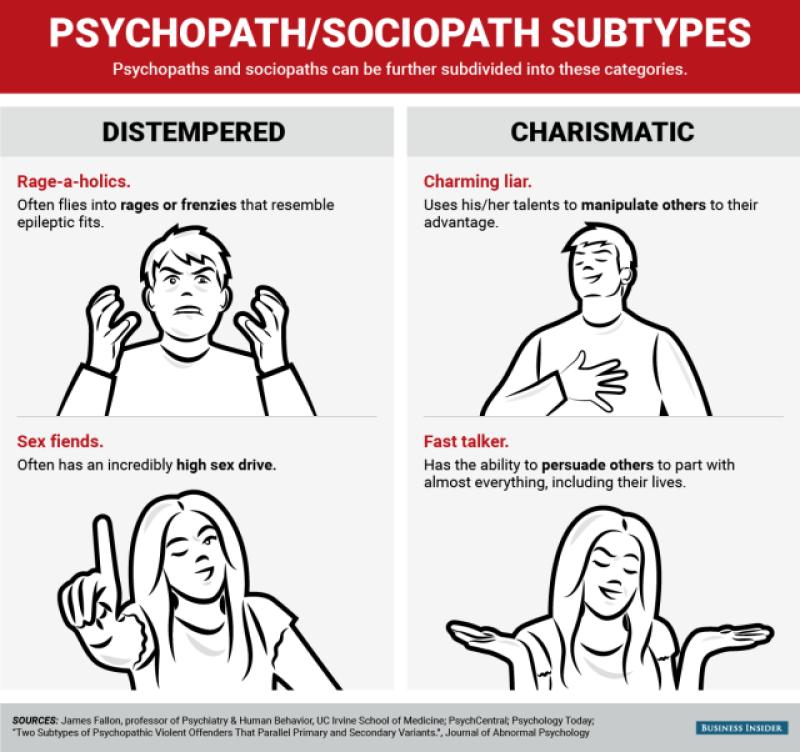What are signs that someone is a sociopath?
It's important to note that diagnosing someone as a sociopath or having antisocial personality disorder (ASPD) should be done by a qualified mental health professional. However, there are certain behavioral patterns and traits that are commonly associated with sociopathy. Keep in mind that these traits can vary in intensity, and the presence of one or more of these traits does not necessarily indicate sociopathy. Additionally, some of these traits may be more common in other personality disorders or may be present in individuals without a mental health disorder. Here are some potential signs:
Superficial Charm: Sociopaths often have a superficial charm that allows them to manipulate others effectively.
Lack of Empathy: Difficulty understanding or experiencing empathy is a common trait. They may seem indifferent to the feelings of others.
Manipulative Behavior: Sociopaths are skilled at manipulating people to achieve their own goals. They may use deceit, charm, or intimidation to get what they want.
Lack of Remorse or Guilt: Individuals with sociopathic traits may not feel guilty about harming others and may rationalize their behavior.
Impulsivity: A tendency to act on impulse without considering the consequences. This can lead to risky behaviors.
Irresponsibility: A pattern of not taking responsibility for one's actions or obligations.
Promiscuous Sexual Behavior: Engaging in multiple short-term relationships or having a history of infidelity.
Criminal Behavior: Some sociopaths engage in criminal activities or have a history of legal problems.
Aggressive Behavior: Frequent displays of aggression or irritability, including physical fights.
Lack of Long-Term Goals: Difficulty maintaining consistent long-term goals or employment.
Shallow Emotions: Sociopaths may display a limited range of emotions, and their emotional responses may seem superficial or insincere.
Egocentrism: A self-centered outlook with little regard for the needs or feelings of others.
It's important to remember that individuals may exhibit some of these traits without being sociopaths, as personality is complex, and these behaviors can be influenced by various factors. Moreover, some people with antisocial traits may function well in society and not necessarily engage in criminal behavior. If you suspect someone may have sociopathic traits, it's advisable to consult with a mental health professional for a thorough assessment and diagnosis.
What behaviors or traits indicate that someone might be a sociopath?
Sociopathy, also known as antisocial personality disorder (ASPD), is a mental disorder characterized by a disregard for the rights and feelings of others. People with ASPD often display a pattern of manipulative, impulsive, and deceitful behavior. Some of the most common behaviors and traits that may indicate someone is a sociopath include:
Lack of empathy: Sociopaths have difficulty understanding and sharing the feelings of others. They may seem callous or indifferent to the pain or suffering of others.
Impulsivity: Sociopaths often act without considering the consequences of their actions. They may engage in risky or reckless behavior, such as substance abuse or driving under the influence.
Manipulation: Sociopaths are often skilled at manipulating others to get what they want. They may use flattery, charm, or guilt to control others.
Deceitfulness: Sociopaths often lie to others to achieve their goals. They may also be dishonest about their past or their true intentions.
Reckless disregard for the safety of others: Sociopaths may engage in reckless or dangerous behavior that puts themselves or others at risk. They may also be violent or aggressive.
Lack of remorse: Sociopaths do not feel guilty or remorseful about their actions, even if they have harmed others.
How can you identify signs of sociopathy in an individual's behavior?
It is important to note that not everyone who exhibits some of these behaviors is necessarily a sociopath. However, if someone consistently displays a pattern of these behaviors, it may be a sign of ASPD. Here are some specific things to look for:
Does the person seem to enjoy hurting others? Sociopaths often derive pleasure from inflicting pain on others, whether physically or emotionally.
Does the person take responsibility for their actions? Sociopaths often blame others for their problems or make excuses for their behavior.
Does the person learn from their mistakes? Sociopaths often repeat the same mistakes over and over again, without seeming to learn from the consequences.
Does the person have close relationships? Sociopaths often have difficulty maintaining close relationships, as they may use others for their own gain or be unable to reciprocate feelings of love and affection.
What are the common indicators of sociopathic tendencies?
In addition to the behaviors and traits listed above, there are some other common indicators of sociopathic tendencies. These include:
A history of juvenile delinquency: Sociopaths often display a pattern of antisocial behavior in childhood, such as delinquency, aggression, or cruelty to animals.
A lack of social norms: Sociopaths may not understand or follow social norms, such as respect for others' property or personal space.
A tendency to break rules: Sociopaths may often break rules or violate laws.
A lack of insight into their own behavior: Sociopaths may not be aware of how their behavior affects others, or they may deny that their behavior is a problem.
If you are concerned that someone you know may be a sociopath, it is important to seek professional help. A mental health professional can assess the individual and make a diagnosis of ASPD. With treatment, people with ASPD can learn to manage their symptoms and lead more productive lives.












